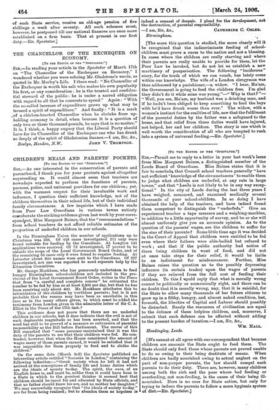MO 'TER EDITOR or THE "SpEarsTas."3
SIR,—Permit me to reply to a letter in your last week's issue from Miss Margaret Baines, a distinguished member of the Leeds Board of. Guardians. Miss Baines states that it is fair to conclude; that Council school teachers generally " have not sufficient knowledge of the circumstances' to enable them to judge what children are underfed, at any rate in large towns," and that "Leeds is not likely to be in any way excep- tional." In the city of Leeds during the last three years I have weighed, measured, and examined medically several thousands of poor school-children. In so doing I have obtained the help of the teachers, and have indeed found them competent to distinguish the " underfeds." Give an experienced teacher a tape measure and a weighing-machine, in addition to a little opportunity of survey, and he or she will almost uniformly give you an accurate opinion. As to the question of the parents' wages, are the children to suffer for the sins of their parents? Some little time ago it was decided in the Court of Appeal that children were entitled to be fed even where their fathers were able-bodied but refused to work ; and that if the public authority had notice of there being children in want of food, and did not at once take steps for their relief, it would be liable to an indictment for misdemeanour. Further, Miss Baines raises the question as to the possibly depressing influence (in certain trades) upon the wages of parents if they are relieved from the full cost of feeding their children. To this I would reply that what is morally wrong cannot be politically or economically right, and there can be no doubt that it is morally wrong, nay, that it is suicidal, for the State to allow many thousands of her future citizens to grow up in a filthy, hungry, and almost naked condition, lest, forsooth, the liberties of Capital and Labour should possibly be disturbed. Surely the resources of civilisation are equal to the defence of these helpless children, and, moreover, I submit that such defence can be effected without adding to the present burden of taxation.—I am, Sir, &c., Headingley, Leeds. Wm. Ham
[.We cannot at all agree with our correspondent that because children are anaemic the State ought to feed them. The State should only feed those whose parents are proved unable to do so owing to their being destitute of means. When children are badly nourished owing to actual neglect on the part of non-pauper parents, the law should compel such parents to do their duty. There are, however, many children among both the rich and the poor whose bad feeding or overfeeding, not non-feeding, is the cause of their being ill- nourished. Here is no case for State action, but only for trying to induce the parents to follow a more hygienic system of diet.—En. Spectator.]










































 Previous page
Previous page